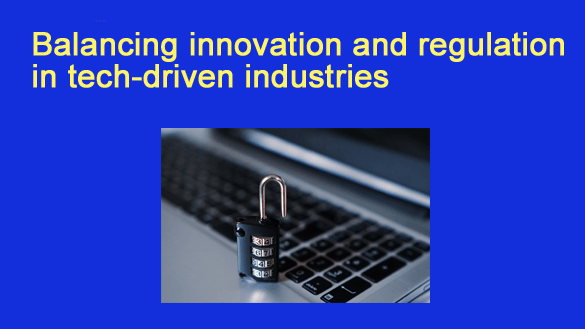 Alongside remarkable technological advancements comes a wave of challenges that require careful navigation. Cybersecurity breaches, misuse of data, and ethical dilemmas are just a few of the hurdles that arise as technology expands its reach.
Alongside remarkable technological advancements comes a wave of challenges that require careful navigation. Cybersecurity breaches, misuse of data, and ethical dilemmas are just a few of the hurdles that arise as technology expands its reach.
The challenge lies in balancing this rapid innovation with the need for regulation, creating an environment that supports progress while protecting individuals and communities.
In tech-driven industries, finding this equilibrium is crucial. Regulations safeguard privacy, prevent harm, and promote fairness, while innovation fuels growth and development. The relationship between the two is intricate, often leading to friction as laws struggle to keep up with technological breakthroughs.
Role of Criminology in Tackling Tech-Related Crimes
As technology advances, so do the crimes that exploit it. Cybercrimes like hacking, ransomware, identity theft, and phishing have become increasingly common. These crimes target individuals, businesses, and even governments, causing financial loss and undermining trust in digital systems. The intersection of law and technology has never been more significant, highlighting the need for skilled professionals who can overcome these emerging threats.
The rising demand for criminology experts reflects this urgent need. Professionals who understand the nuances of tech-related crimes are critical in investigating offenses, shaping regulations, and preventing future incidents. For those looking to enter this growing field, online degrees in criminology offer an ideal pathway. These programs combine flexibility with practical training, allowing students to gain hands-on experience while studying. As tech-related crimes become more sophisticated, well-educated criminology professionals play a vital role in maintaining the balance between innovation and regulation.
Regulatory Challenges in Tech-Driven Industries
Keeping up with technology’s rapid growth is no small feat for regulators. Industries like cryptocurrency, artificial intelligence, and autonomous vehicles have surged ahead of existing laws, creating regulatory gaps that are challenging to fill. These gaps leave room for misuse, as well as uncertainty for businesses trying to comply with outdated or unclear guidelines.
One prominent example is the rise of artificial intelligence (AI). While AI has revolutionized industries such as healthcare and finance, its applications also raise ethical and legal questions. Issues like algorithmic bias, privacy concerns, and accountability in decision-making highlight the need for robust regulations that address these complexities. However, creating such frameworks requires a deep understanding of both the technology and its societal implications, underscoring the importance of collaboration between tech innovators and regulatory bodies.
Balancing Innovation and Consumer Protection
Innovating responsibly is a balancing act. Companies must push boundaries and explore new possibilities while keeping user safety and trust at the forefront. Striking this balance is essential for maintaining consumer confidence and avoiding potential backlash from harmful practices.
Some organizations have found ways to navigate this challenge successfully. For example, tech companies in the financial sector have embraced advanced encryption techniques to protect user data while developing innovative tools for online banking and investment. These efforts demonstrate that it’s possible to prioritize consumer protection while driving technological progress. Lessons from such successes can serve as a blueprint for other industries navigating the tension between innovation and regulation.
Role of Technology in Shaping Modern Regulation
Technology is no longer just a challenge for regulators; it’s also an asset. Tools like artificial intelligence (AI) and blockchain are being adopted to make regulatory processes more efficient and transparent. AI systems can monitor compliance in real-time, flagging unusual activities and helping both companies and regulators respond more effectively. These innovations streamline oversight, allowing regulations to keep pace with the industries they govern.
Blockchain is also proving to be a transformative tool for regulatory frameworks. Its ability to create secure and traceable records has applications in everything from finance to supply chain management. These technologies help meet immediate regulatory needs and provide the adaptability required to tackle emerging challenges in fast-moving tech sectors.
Bridging the Gap Between Innovators and Regulators
Innovators and regulators often find themselves at odds, with each side prioritizing different goals. Innovators focus on speed and breakthroughs, while regulators prioritize safety and societal impact. Bridging this gap is essential to creating a balanced ecosystem where innovation can thrive responsibly.
Collaboration is the key to solving this problem. Initiatives that bring together industry leaders, policymakers, and subject-matter experts help craft regulations that are informed and actionable. For example, advisory panels and pilot programs allow new technologies to be tested within regulatory frameworks before widespread adoption. These efforts create mutual understanding and lead to practical policies that meet the needs of both innovators and society.
Fostering Ethical Innovation
Ethical considerations have become critical in technology-driven industries. Companies must adopt practices that align with societal values, from protecting user data to tackling environmental concerns. Businesses that prioritize ethics build trust and long-term relationships with consumers while avoiding conflicts with regulatory bodies.
Creating an ethical framework starts with accountability. Companies can establish internal policies, conduct audits, and engage with diverse stakeholders to identify potential issues. These steps allow businesses to address challenges proactively rather than reacting to external pressures. Prioritizing ethics is not just about compliance—it’s about creating technology that serves a broader, more positive purpose.
Balancing innovation with regulation is an ongoing challenge for tech-driven industries, but it is a necessary one. Tools like AI and blockchain are enhancing regulatory processes, while collaboration between innovators and policymakers is paving the way for more effective frameworks. Ethical practices add another layer of responsibility so that progress aligns with societal needs. With thoughtful strategies, technology can continue to advance while addressing challenges responsibly. Striking this balance benefits businesses, consumers, and society, creating a future where innovation serves as a force for good.